Human Rights in India Chapter Notes | Legal Studies for Class 12 - Humanities/Arts PDF Download
| Table of contents |

|
| Introduction |

|
| Indian Constitutional Framework on Human Rights and Related Laws in India |

|
| Directive Principles of State Policy |

|
| Fundamental Duties - Part IV(A) - Article 51A |

|
Introduction
Human rights are the basic standards that protect the dignity and respect of every person. They are like rules that make sure everyone is treated fairly and has what they need to live a good life. These rights are about how people should get along with each other and how the government should treat its people. Human rights include important things like the right to be safe, the right to be healthy, and the right to be free from harm.
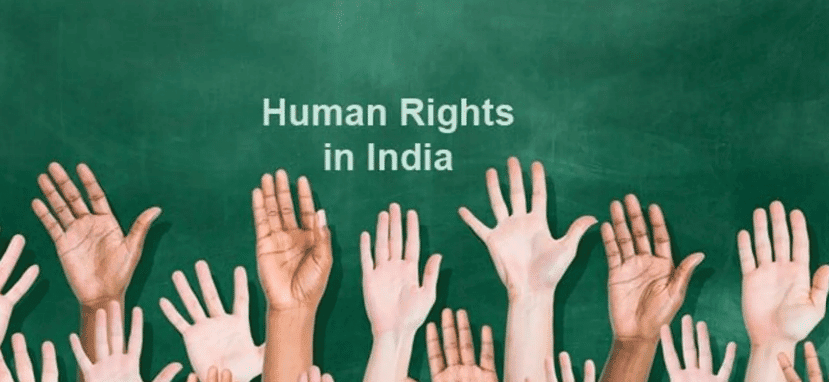
(i) How did the story of Human Rights begin?
- 539 BC: Birth of Human Rights In 539 BC, Cyrus the Great conquered Babylon and made a groundbreaking decision. He freed the slaves and allowed people to choose their own religion. This act is considered one of the earliest forms of human rights.
- The Cyrus Cylinder. clay tablet known as the Cyrus Cylinder, which contained Cyrus's statements, is regarded as the first human rights declaration in history.
- 20th Century: The Need for Human Rights During World War II, the world witnessed horrific acts that shocked humanity. In response to these atrocities, the Universal Declaration of Human Rights (UDHR) was adopted by the United Nations in December 1948. The UDHR recognized human rights as essential for freedom, justice, and peace.
(ii) What is a Right?
A right is something that you are allowed to have or do, either because it is morally right or because the law says so. It means you have a good reason to expect that others will respect this right. Rights can be about basic human needs, like the right to be treated fairly and with respect. There are two main types of rights:
- Human Rights. These are rights that belong to everyone simply because they are human beings. They are not given by any government or authority.
- Fundamental Rights. These are basic rights guaranteed by the Constitution of a country. If these rights are violated, citizens can go to court to seek protection.
(iii) What are Human Rights?
Human rights are the basic rights that every person has just because they are human. These rights are not given by any government or authority. They belong to all people, no matter where they come from, what they believe in, or who they are. Human rights are the things that help people live with dignity and fairness. That's why they are the same for everyone, everywhere, and they can't be taken away. However, there are some situations where these rights can be limited, but only following the law. For example, if someone commits a crime, their right to freedom can be restricted by a court. Some examples of human rights include:
- Right to life
- Right to food
- Right to education
- Right to work
- Right to health
- Right to liberty
(iv) International Human Rights
- In 1948, the United Nations General Assembly adopted the Universal Declaration of Human Rights (UDHR) as a common standard for all people and nations.
- The UDHR outlines various human rights that apply to everyone, including fundamental, civil, political, economic, social, and cultural rights. Examples include:
- Freedom of speech, assembly, conscience, and religion
- Right to education, livelihood, and decent living standards
- Right to life, liberty, and personal security
- Right to equality and freedom from discrimination based on gender, race, etc.
- The principle of universality means that everyone is entitled to their human rights equally. These rights are inalienable, meaning they cannot be taken away, except in specific cases and through due process, like restricting liberty for convicted criminals.
- The UDHR has been accepted by nearly all UN member states, which commit to respecting and protecting the basic human rights outlined in the declaration.
(v) What are Fundamental Rights?
Fundamental Rights are the basic rights that every citizen of a country is entitled to. These rights are written in the Constitution and can be enforced in a court of law. If someone’s Fundamental Rights are violated, they have the right to go to court to protect these rights.
Difference Between Fundamental Rights and Human Rights
Fundamental Rights are the basic rights guaranteed to the citizens of a country by its constitution. These rights are essential for the development and dignity of individuals and are protected by law. However, the specific Fundamental Rights may vary from one country to another.
On the other hand, Human Rights are the inherent rights that every human being is entitled to, regardless of their nationality, ethnicity, or religion. Human Rights are universal and applicable to all individuals across the globe.
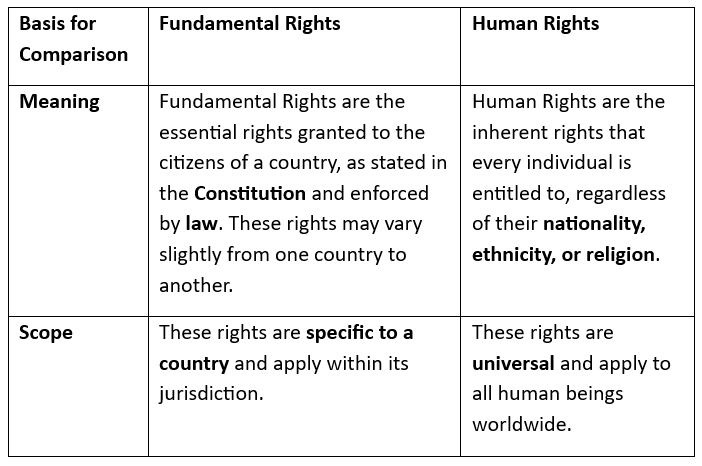
Both Fundamental Rights and Human Rights are crucial for creating a better environment for people and helping them preserve their dignity.
(vi) Sustainable Development Goals and Human Rights
The Sustainable Development Goals (SDGs) and human rights are closely interconnected. In fact, over 90 percent of the SDGs are related to human rights obligations. When a State makes progress towards achieving the SDGs, it also moves forward in fulfilling its human rights obligations.
Some of the SDGs that are linked to human rights include:
- No Poverty: This goal aims to eradicate extreme poverty for all people everywhere, which is a fundamental human right.
- Gender Equality: This goal seeks to achieve gender equality and empower all women and girls, ensuring their rights and freedoms.
- Zero Hunger: This goal aims to end hunger, achieve food security and improved nutrition, and promote sustainable agriculture, which are all essential human rights.
Indian Constitutional Framework on Human Rights and Related Laws in India
Human rights in India are fundamentally embedded in the Constitution, similar to countries like the US and South Africa. The framework for human rights within the Indian Constitution comprises several key components:
- The Preamble
- Fundamental Rights. These are detailed in Part III of the Constitution.
- Directive Principles. Found in Part IV of the Constitution.
- Fundamental Duties. These are outlined in Part IV(A) of the Constitution.
1. The Preamble
The Preamble of the Constitution of India sets forth its aims, objectives, and guiding principles. It serves as a foundational framework for interpreting ambiguous provisions of the Constitution.
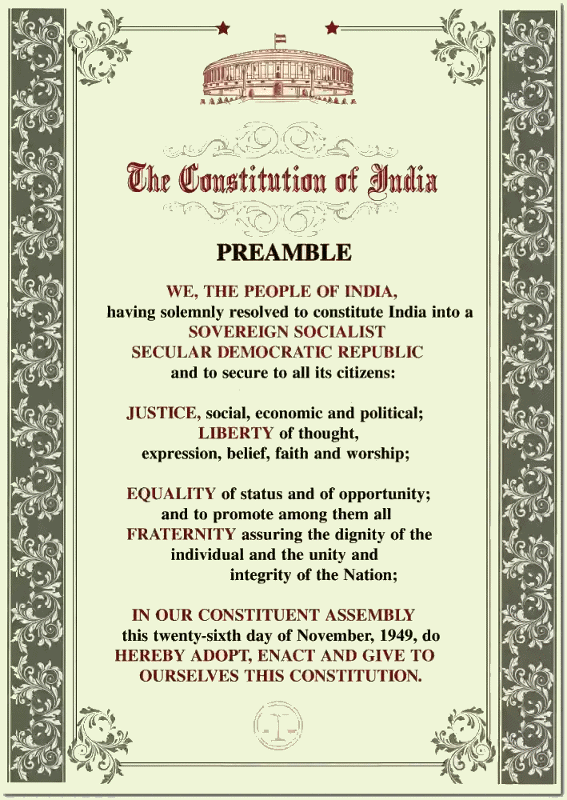
Considered the 'basic structure' of the Constitution, the Preamble's principles prevent Parliament from amending certain core features, such as democracy, rule of law, secularism, separation of powers, and judicial review. These features are crucial for maintaining the Constitution's integrity.
The Preamble also proclaims various rights and freedoms, which are detailed in different parts and clauses of the Constitution, ensuring these are secured for all citizens.
2. Fundamental Rights - Part III of the Constitution
(i) Articles 12-35 in Part III of the Constitution outline the provisions related to fundamental rights, which are primarily civil and political in nature.
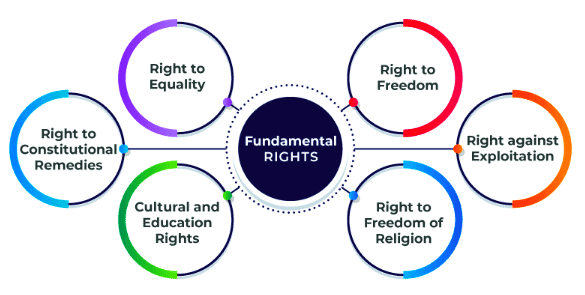
The fundamental rights in India include:
- Right to Equality. Articles 14-18
- Right to Freedom. Articles 19-22
- Right Against Exploitation. Articles 23-24
- Right to Freedom of Religion. Articles 25-28
- Cultural and Educational Rights. Articles 29-30
- Right to Constitutional Remedies. Article 32
(ii) Some key features of Fundamental Rights are:
- They are enforceable by higher courts in India.
- Article 32 allows individuals to petition the Supreme Court for the enforcement of these rights.
- Article 13 ensures that no law or order contradicts or infringes upon fundamental rights.
- They are primarily enforceable against the State, with some rights applicable to private individuals.
(iii) Let us now understand various fundamental rights in detail :
a) Right to Equality - Articles 14-18
Brief description
- Article 14: Guarantees equality before the law and equal protection of the laws, prohibiting discrimination based on religion, race, caste, sex, or place of birth.
- Article 15: Prohibits discrimination against any citizen on grounds of religion, race, caste, sex, place of birth, or any of these.
- Article 16: Ensures equality of opportunity for all citizens in matters of employment or appointment to any office under the State.
- Article 17: Abolishes untouchability.
- Article 18: Abolishes all titles except for military and academic distinctions.
Article 14: Right to Equality before Law
- Article 14 ensures the right to equality before the law and equal protection of the law to all individuals.
- It prohibits discrimination on the basis of religion, race, caste, sex, or place of birth.
- This means that the law treats everyone equally, regardless of their rank, status, or background.
- Equality Principle: The principle of equality does not mean applying the same law to everyone without consideration of their circumstances.
- It means treating equals similarly and unequals differently.
- Article 14 does not imply absolute equality; different situations may require different treatments under the law.
- The State is allowed to make reasonable classifications for legislative purposes and treat individuals within a class equally.
Example: The Prohibition of Child Marriage Act, 2006 distinguishes between girls and boys based on age in relation to the prohibition of child marriage.
Article 15: Prohibition of Discrimination
- Article 15 is based on the principle of equality and prohibits the State from discriminating against individuals on the grounds of religion, race, caste, sex, or place of birth.
- It also prohibits anyone from using these grounds to restrict citizens from entering shops, public restaurants, hotels, and places of public entertainment, as well as using public facilities like wells, tanks, bathing ghats, roads, and places of public resort.
Article 16: Equality of Opportunity in Public Employment
- Article 16 provides for equality of opportunity in matters of public or State employment and bars discrimination on the grounds of religion, race, caste, sex, descent, place of birth, or residence.
- However, it allows the State to provide reservation or affirmative action programs for government jobs to backward classes like Scheduled Castes and Scheduled Tribes who have been historically and continuously disadvantaged and inadequately represented in State services.
Article 17: Abolition of Untouchability
- Article 17 abolishes 'Untouchability' and forbids its practice in any form.
- This article can be enforced against both the State and private individuals.
- The offence of untouchability is punishable under special laws like the Protection of Civil Rights Act, 1955 and the Scheduled Caste and Scheduled Tribe (Prevention of Atrocities) Act, 1989.
- These laws aim to remove harassment and abuses against 'Dalits' and 'Adivasis' by the State or private individuals.
Article 18 of the Constitution deals with the abolition of titles. It contains the following provisions:
- Prohibition of Titles: The State shall not confer any title, except for military or academic distinctions.
- Acceptance of Foreign Titles: No citizen of India shall accept any title from a foreign State.
- Foreign Titles for Non-Citizens:. person who is not a citizen of India cannot accept a title from a foreign State while holding an office of profit or trust under the State, without the consent of the President.
- Presents and Emoluments from Foreign States: No person holding an office of profit or trust under the State shall accept any present, emolument, or office from a foreign State without the consent of the President.
Article 19: Fundamental Freedoms
Article 19 of the Constitution guarantees and safeguards several fundamental freedoms for all citizens of India. These freedoms are essential for ensuring individual rights and promoting a democratic society. The specific freedoms protected under Article 19 include:
- Freedom of Speech and Expression: Citizens have the right to express their thoughts, opinions, and ideas freely through speech, writing, or any other form of communication.
- Freedom to Assemble Peaceably and Without Arms: Individuals can gather peacefully for any purpose, without the use of weapons. This includes the right to hold meetings, protests, and demonstrations.
- Freedom to Form Associations or Unions: Citizens have the right to form associations, unions, or organizations for any lawful purpose. This includes trade unions, social clubs, and other groups.
- Freedom to Move Freely Throughout the Territory of India: Individuals can move and travel freely within the entire territory of India without any restrictions.
- Freedom to Reside and Settle in Any Part of the Territory of India: Citizens have the right to reside and settle in any part of the country, without facing discrimination or restrictions.
- Freedom to Practice Any Profession or Carry on Any Occupation, Trade, or Business: Individuals can choose and practice any profession, occupation, trade, or business of their choice, subject to reasonable restrictions.
(b) Reasonable Restrictions on Freedoms under Article 19
- Article 19 of the Indian Constitution guarantees certain fundamental freedoms, but these freedoms are not absolute. The article allows for "reasonable restrictions" on these rights under specific circumstances.
- The State can impose limitations on the "freedom of speech and expression" to protect various interests, including:
- Sovereignty and integrity of India
- Security of the State
- Friendly relations with foreign States
- Public order
- Decency and morality
- Contempt of court
- Defamation
- Incitement to an offence
- For example, the State can prohibit inciting speeches that may lead to violence.
- The chart below details the various conditions under which the State can limit freedoms:
- Freedoms Restrictions (grounds)
- Freedom of speech and expression Grounds:
- Sovereignty and integrity of India Security of the State
- Freedom of assembly Grounds:
- Sovereignty and integrity of India Public order
- Freedom of association Grounds:
- Sovereignty and integrity of India Public order or morality
- Freedom of movement Grounds:
- Interests of the general public Protection of Scheduled Tribes
- Freedom of profession, occupation, trade, or business Grounds:
- Interests of the general public State-prescribed qualifications
- State-run enterprises excluding citizen participation
- However, the Supreme Court has the authority to invalidate State restrictions if they are deemed unreasonable. For instance, the State cannot impose restrictions simply because it fails to maintain public order.
- An example of unreasonable restriction would be banning the sale of a book due to a few unruly protesters, as this would violate the author’s right to freedom of speech and expression.
Human Rights Framework in the Criminal Justice System
Article 20: Rights of Persons Accused of Crimes
- Article 20 of the Indian Constitution safeguards the rights of individuals accused of crimes, forming a crucial part of the human rights framework within the criminal justice system.
- It ensures that no person can be convicted for an act that was not considered an offense by law at the time it was committed.
Example: Section 377 of the Indian Penal Code (IPC)
- Section 377 of the IPC originally treated consensual homosexual conduct between same-sex adults as a criminal offense.
- In 2009, the Delhi High Court declared Section 377 invalid and unconstitutional, recognizing the rights to privacy, non-discrimination, and liberty for lesbian, gay, bisexual, and transgender individuals.
- However, the Supreme Court reversed this decision in 2013.
- In 2018, the Supreme Court overturned its 2013 judgment and struck down Section 377 as unconstitutional.
Application of Sodomy Law
- The example illustrates how the sodomy law applies based on the timing of legal changes:
- Consensual homosexual conduct in 2011 would not be subject to Section 377 because the law was not in effect at that time.
- Conduct that took place between the Supreme Court’s 2013 decision and its 2018 judgment would be subject to Section 377.
Article 20
- 1. Protection against Retroactive and Prospective Laws: Article 20 safeguards individuals by prohibiting the application of laws both retroactively and prospectively. This means that laws cannot be applied to actions taken before the law was in place, nor can they be applied to future actions in a manner that is unfair.
- 2. Protection against Ex Post Facto Laws: Article 20(1) protects individuals from being punished under a law that was not in force at the time of the offence. For example, if a new law is enacted that imposes a harsher penalty for a crime, it cannot be applied to offences committed before the law came into effect.
- 3. Protection against Double Jeopardy: Article 20(2) ensures that no person can be prosecuted and punished for the same offence more than once. This means that if a person is acquitted or convicted for a particular offence, they cannot be tried again for the same offence.
- 4. Protection against Self-Incrimination: Article 20(3) protects the accused from being compelled to be a witness against themselves. This means that an accused person cannot be forced to provide evidence that may incriminate them. They have the right to remain silent and cannot be coerced into giving self-incriminating evidence.
- 5. Right to Fair Trial: Article 20 guarantees the right to a fair trial for every accused person. This includes the right to legal representation, the right to a public trial, and the right to an impartial judge.
Article 21
Right to Life and Personal Liberty
Article 21 of the Indian Constitution states, "No person shall be deprived of his life or personal liberty except according to procedure established by law." This fundamental right is crucial and covers a wide range of rights, applicable to both citizens and non-citizens.
Right to Life
- The "right to life" includes various aspects such as:
- Right to human dignity
- Right to basic necessities of life
- Right to participate in activities and express oneself
- Right to tradition, heritage, and culture
- Right to privacy
- Right to a pollution-free environment
- Right to livelihood
- Right against sexual harassment
- Right against solitary confinement
- Right to legal aid
- Right to a speedy trial
- Right against delayed execution in capital punishment
- Right against custodial violence
- Right to shelter
- Right to healthcare and medical provisions
- Right against bonded labor
- Right against cruel and unusual punishment
Personal Liberty
- "Personal liberty" refers to various rights that ensure an individual's freedom to act according to their will.
- The concept of "right to life and personal liberty" is broad and encompasses numerous aspects that protect individuals' fundamental freedoms and rights.
Procedure Established by Law
- The second part of Article 21 outlines that the right to life and personal liberty can only be curtailed by a procedure established by law. This means that any law limiting these rights must follow a fair, reasonable, and non-arbitrary procedure.
- For instance, the Indian Penal Code (IPC) prescribes the death penalty for certain crimes, but this involves established procedures such as:
- Death penalty being awarded only in "rarest of rare" cases
- Ensuring no undue delay in executing prisoners on death row, with provisions for appeal in cases where the wait exceeds five years
Article 21A
Right to Education
Article 21A of the Indian Constitution states, "The State shall provide free and compulsory education to all children of the age of six to fourteen years in such manner as the State may, by law, determine." This article ensures the right to education for children between the ages of six and fourteen and mandates the State to implement this provision.
Historical Context
- Before 2002, elementary education for children aged six to fourteen was considered a policy goal in the Directive Principles of State Policy. The Supreme Court elevated this status, declaring that denying education infringes on the right to life under Article 21, which is a fundamental right.
- In 2002, Article 21A was added as a fundamental right by the Constitution (Eighty-sixth Amendment) Act, 2002, making the right to education for children aged six to fourteen enforceable.
The Right of Children to Free and Compulsory Education (RTE) Act, 2009
- The RTE Act, enacted by the Parliament of India in 2009, stipulates that every child has the right to free and compulsory education until the completion of elementary education in a neighborhood school.
Right to Free and Compulsory Education (RTE) Act, 2009
The RTE Act places a legal duty on both the state and central governments to uphold and implement the fundamental rights of children as per the provisions of the Act. However, the effective implementation of this right necessitates substantial financial and budgetary expenditures from the state, especially considering the high illiteracy rate. Unfortunately, these expenditures have been insufficient so far.
Article 22: Protection against Arrest and Detention
- Grounds for Arrest: No individual can be detained in custody without being informed of the grounds for their arrest.
- Right to Legal Counsel: An arrested or detained person has the right to consult and be defended by a legal practitioner of their choice.
- Production Before Magistrate:. person arrested and detained must be presented before the nearest magistrate within twenty-four hours, excluding travel time.
- Limit on Detention: No individual can be detained in custody beyond twenty-four hours without the authority of a magistrate.
Exceptions: The safeguards mentioned above do not apply to:
- Foreign Nationals: Persons from enemy countries.
- Preventive Detention: Individuals arrested or detained under preventive detention laws.
Preventive Detention Laws: These laws allow for the detention of individuals based on suspicion, even if they have not been found guilty of a crime. The rationale is that their release may pose a threat to society, such as the potential for further criminal activities, hindering state investigations, or addressing mental health issues. However, there is a risk of misuse of preventive detention laws, leading to human rights violations of the detained individuals.
Detention vs. Arrest: It is essential to understand the distinction between detention and arrest.
- Detention occurs when the police have reasonable suspicion that an individual may have engaged in or may engage in criminal activity, and they need to question the person.
- Arrest happens when a person is formally charged with a crime. The key difference lies in whether the individual is charged with a crime at the time of being detained or arrested.
(c) Right Against Exploitation: Articles 23 and 24
Article 23:
- Prohibition of Traffic in Human Beings and Forced Labour. Article 23 of the Constitution prohibits human trafficking, begar, and forced labour.
- Begar is a Persian word that refers to a practice where a worker is forced to provide services to a master without payment or at a nominal wage. It is a form of forced labour.
Article 24:
- Prohibition of Employment of Children in Hazardous Work. Article 24 prohibits the employment of children below the age of fourteen years in factories, mining, and other hazardous occupations.
Human Trafficking involves the following:
- ACT: Recruitment, Transport, Transfer, Harbouring, Receipt of persons
- Means: Threat or use of force, coercion, Abduction, Fraud, Deception, Abuse of power or vulnerability, Giving payments or benefits
- Purpose: Exploitation including Prostitution of others, Sexual exploitation, Forced labour, Slavery or similar practices, Removal of organs, Other types of exploitations
Top 10 Countries Infamous for Human Trafficking:
Other Examples of Human Trafficking:
- Forced sex work
- Forced organ transplantation
- Forced surrogacy
- Forced labour in factories
- Forced begging
(d) Right to Freedom of Religion - Articles 25-28
Article 25: Freedom of Conscience and Religion
- Article 25 grants everyone the right to freedom of conscience and the freedom to profess, practice, and propagate their religion, as long as these actions do not disrupt public order, morality, and health.
- For instance, regarding the use of loudspeakers for religious purposes, the Supreme Court has clarified that no religion mandates performing prayers in a way that disturbs others' peace, such as using voice amplifiers or drums.
- Noise pollution norms must be followed, even in religious practices.
- The wearing and carrying of kirpans, a practice in Sikhism, is allowed as it does not threaten public order, morality, or health.
- The state has the authority to regulate or restrict economic, financial, political, or other secular activities linked to religious practices.
- The state can also implement social welfare and reforms in Hindu, Sikh, Jain, or Buddhist religious institutions and open these institutions to all classes and sections of society.
Article 26: Freedom to Manage Religious Affairs
- Article 26 grants every religious denomination, including its sub-sects, the right to establish and maintain institutions for religious and charitable purposes, manage their own religious affairs, and own and acquire movable and immovable property.
- These rights are subject to the condition that they do not endanger public order, morality, and health.
Article 27: Freedom from Religious Taxation
- Article 27 prohibits forcing individuals to pay taxes on revenues used for promoting or maintaining any religion or sect.
- For example, donations made to temples for their upkeep cannot be taxed.
Article 28: Freedom from Religious Instruction in Educational Institutions
Article 28 outlines the following provisions regarding religious instruction in educational institutions:
- No religious instruction shall be provided in educational institutions wholly maintained out of State funds.
- Institutions established under an endowment or trust requiring religious instruction are exempt from this rule.
- Attendance in religious instruction or worship in State-recognized or State-aided institutions is voluntary and requires consent.
Explanation: Article 28 prohibits religious instructions in government-run educational institutions, such as Sainik Schools and Kendriya Vidyalayas. However, institutions established by trusts or endowments requiring religious instruction are exempt. State-recognized or aided institutions cannot force students to participate in religious activities without consent, and guardians must consent for minors.
Fundamental Rights in the Constitution
Right to Equality - Articles 14-18
- Article 14: Guarantees equality before the law and equal protection of the laws to all individuals within India.
- Article 15: Prohibits discrimination on grounds of religion, race, caste, sex, or place of birth. It also allows the state to make special provisions for women and children and for the advancement of any socially and educationally backward classes of citizens or for Scheduled Castes and Scheduled Tribes.
- Article 16: Ensures equality of opportunity in matters of public employment and prohibits discrimination in this regard.
- Article 17: Abolishes "untouchability" and forbids its practice in any form.
- Article 18: Abolishes titles except for military or other similar distinctions.
Right to Freedom - Articles 19-22
- Article 19: Provides the right to freedom of speech and expression, assembly, association, movement, residence, and profession, subject to reasonable restrictions.
- Article 20: Protects individuals from ex post facto laws, double jeopardy, and self-incrimination.
- Article 21: Guarantees the right to life and personal liberty, which has been interpreted broadly by the Supreme Court to include various aspects of life and dignity.
- Article 22: Provides protection against arrest and detention in certain cases, including the right to be informed of the grounds of arrest, the right to consult a legal practitioner, and the right to be produced before a magistrate.
Right against Exploitation - Articles 23-24
- Article 23: Prohibits human trafficking and forced labor, and makes the practice of begging and other forms of forced labor punishable.
- Article 24: Prohibits the employment of children below the age of 14 years in hazardous industries and other specified forms of employment.
Right to Freedom of Religion - Articles 25-28
- Article 25: Guarantees the freedom of conscience and the right to profess, practice, and propagate religion, subject to public order, morality, and health.
- Article 26: Provides the right to manage religious affairs, subject to public order, morality, and health.
- Article 27: Prohibits the state from compelling any citizen to pay taxes for the promotion or maintenance of any particular religion.
- Article 28: Prohibits religious instruction in educational institutions wholly maintained out of state funds, and regulates religious instruction in other educational institutions.
(e) Cultural and Educational Rights - Articles 29-30
- Article 29: Provides protection for the interests of minorities by allowing them to conserve their distinct language, script, or culture, and prohibits discrimination in admissions to educational institutions on grounds of religion, race, caste, or language.
- Article 30: Grants minorities the right to establish and administer educational institutions of their choice and prohibits discrimination by the state in granting aid to educational institutions on grounds of religion or language.
(f) Right to Constitutional Remedies - Article 32
- Article 32: Empowers individuals whose fundamental rights have been violated to petition the Supreme Court directly for enforcement, bypassing lower courts. Article 226 allows High Courts to hear cases of fundamental rights violations directly as well.
Public Interest Litigation: An Overview
Public Interest Litigation, often referred to as Social Action Litigation, is a legal process allowed under Article 32 of the Indian Constitution. This process enables public-spirited individuals or organizations to write letters to the Supreme Court or High Courts, alleging violations of fundamental rights. These letters can be converted into formal petitions by the courts.
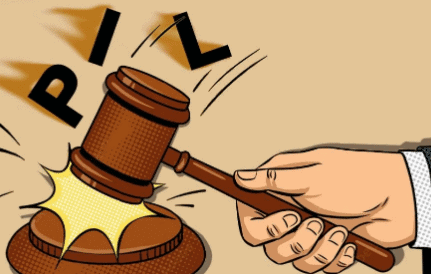 The letters usually highlight violations of fundamental rights experienced by weaker sections of Indian society who are unable to approach the court themselves. This includes vulnerable groups such as:
The letters usually highlight violations of fundamental rights experienced by weaker sections of Indian society who are unable to approach the court themselves. This includes vulnerable groups such as:
- People in custody
- Victims of police violence
- Forced bonded laborers
- Migrant and contracted laborers
- Child workers
- Rickshaw pullers
- Hawkers
- Pensioners
- Pavement dwellers
- Slum dwellers
Additionally, courts can take cognizance of newspaper reports that allege fundamental rights violations, further broadening the scope of Public Interest Litigation.
Directive Principles of State Policy
Articles 36 to 51 in Part IV of the Constitution outline the guiding principles for governance by the State, known as the Directive Principles of State Policy.
These principles play a crucial role in shaping laws and policies related to social and human development. Here are some key features of the Directive Principles:
- Duty of the State: It is the responsibility of the State to apply these principles when formulating laws and policies aimed at social and human development.
- Nature of Rights: The principles are primarily focused on economic and social rights, aiming to promote the welfare of the people.
- Enforceability: While these principles are not enforceable by any court of law, they provide essential guidance for drafting and implementing laws and policies.
- Supreme Court's Role: The Supreme Court has, at times, elevated the status of certain Directive Principles to that of Fundamental Rights, especially when they are seen to violate the right to life under Article 21.
- Objectives: Directive Principles aim to secure and protect social, economic, and political justice for citizens. They seek to minimize income inequalities and eliminate disparities based on status, facilities, and opportunities among individuals and groups.
The Directive Principles guide the State in achieving various goals, including:
- Ensuring adequate means of livelihood for all.
- Promoting equal pay for equal work.
- Guaranteeing healthy working conditions.
- Protecting children from exploitation and ensuring their welfare.
- Providing legal aid for securing justice.
- Empowering village panchayats for self-governance.
- Ensuring the right to work, education, and public assistance.
- Promoting just and humane conditions of work.
- Ensuring living wages and decent working conditions.
- Promoting cottage industries in rural areas.
- Involving workers in industrial management.
- Implementing a uniform civil code for all citizens.
- Providing early childhood care and education.
- Promoting the interests of Scheduled Castes, Scheduled Tribes, and other weaker sections.
- Improving nutrition, living standards, and public health.
- Organizing agriculture and animal husbandry scientifically.
- Protecting the environment, forests, and wildlife.
- Preserving monuments and places of artistic or national importance.
- Separating the judiciary from the executive in public services.
- Promoting international peace and security and fostering respectful international relations.
Over time, certain provisions that were originally Directive Principles have been recognized as Fundamental Rights. For example:
- The right to education for children aged six to fourteen, previously a policy goal, is now a Fundamental Right under Article 21A.
- The Supreme Court, in cases like Mohini Jain and Olga Tellis, has interpreted the right to education and right to livelihood as integral to the right to life under Article 21.
In a recent ruling, the court emphasized the responsibility of authorities to offer alternative housing to slum dwellers before demolishing their homes. This decision highlights the need for proper relocation plans to ensure the rights and welfare of vulnerable communities are safeguarded during such actions.
Fundamental Duties - Part IV(A) - Article 51A
Article 51A of the Constitution, found in Part IV(A), outlines the fundamental duties expected of every citizen. These duties reflect certain conduct and behavior that are deemed necessary for the well-being of society. Here are the key features of fundamental duties:
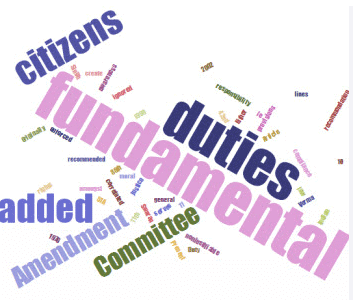
- Non-Enforceability: Fundamental duties cannot be enforced in a court of law, meaning individuals cannot be punished for violating them.
- Standards for Citizens: These duties set standards for citizens to follow, promoting responsible behavior.
- Building a Strong Society: Fundamental duties aim to remind citizens of their role in building a free, democratic, and strong society.
- Potential Future Elevation: There is a possibility that, like some provisions of the directive principles, courts may elevate the status of these duties in the future.
- Respecting National Symbols: Citizens are expected to respect the Constitution, institutions, the National Flag, and the National Anthem.
- Cherishing Freedom Struggles: Citizens should cherish and follow the noble ideals of the national struggle for freedom.
- Upholding Sovereignty: Protecting the sovereignty, unity, and integrity of India is a fundamental duty.
- Defending the Country: Citizens should be ready to defend the country and render national service when called upon.
Promoting Harmony: Citizens are encouraged to promote harmony among religious, linguistic, and regional diversities and to renounce practices derogatory to women’s dignity.
Valuing Heritage: Preserving and valuing the rich heritage and culture of India is a fundamental duty.
Protecting the Environment: Citizens should protect the natural environment, including forests, lakes, rivers, and wildlife.
Developing Scientific Temper: Fostering a scientific temper, humanism, and the spirit of inquiry and reform is encouraged.
Safeguarding Public Property: Citizens should safeguard public property and abjure violence.
Striving for Excellence: Citizens are encouraged to strive for excellence and raise the nation to higher levels of endeavor and achievement.
Providing Educational Opportunities: Parents are duty-bound to provide educational opportunities to their children between the ages of six and fourteen years.
|
98 videos|69 docs|30 tests
|
FAQs on Human Rights in India Chapter Notes - Legal Studies for Class 12 - Humanities/Arts
| 1. What are the key features of the Indian Constitutional Framework on Human Rights? |  |
| 2. How do the Directive Principles of State Policy contribute to human rights in India? |  |
| 3. What are the Fundamental Duties outlined in Article 51A of the Indian Constitution? |  |
| 4. How do Fundamental Rights and Directive Principles of State Policy interact in India? |  |
| 5. Why are human rights important in the context of the Indian Constitution? |  |




















